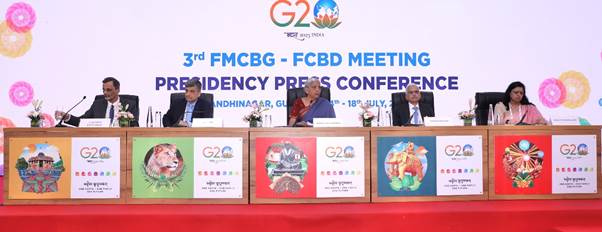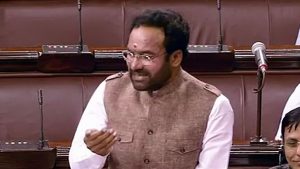Gujarat :- The Third G20 Finance Ministers and Central Bank Governors (FMCBG) meeting under the Indian Presidency was held during 17-18 July 2023 in Gandhinagar, Gujarat. The meeting was jointly chaired by Union Minister of Finance and Corporate Affairs Smt. Nirmala Sitharaman, and Governor, Reserve Bank of India, Shaktikanta Das.

Over 500delegates, including Finance Ministers and Central Bank Governors from G20 member countries, Invitee Countries, and Heads of various International Organisations (IOs) participated in the meeting. The FMCBG meeting was preceded by the Third G20 Finance and Central Bank Deputies (FCBD) meeting during 14-15 July 2023 in Gandhinagar, Gujarat.
Under the Indian Presidency’s theme of “One Earth, One Family, One Future”, G20 Ministers and Governors pledged to prioritise the well-being of the people and the planet and reaffirmed their commitment to enhancing international economic cooperation, strengthening global development for all and steering the global economy towards strong, sustainable, balanced, and inclusive growth (SSBIG).
The meeting was organised in five thematic sessions covering Global Economy and Global Health, Sustainable Finance and Infrastructure, International Financial Architecture, International Taxation, and Financial Sector & Financial Inclusion.
The Union Finance Minister, in her welcome remarks, reiterated the collective responsibility of G20 to steer the global economy towards strong, sustainable, balanced, and inclusive growth. The meeting discussed the key deliverables of the Finance Track under the Indian G20 Presidency for 2023. The Indian Presidency received wide support on all the agenda items.
Members discussed the global economic outlook and risks, including macroeconomic implications of food and energy insecurity as well as climate change. Members endorsed the ‘G20 Report on Macroeconomic Risks Stemming from Climate Change and Transition Pathways’.
Under the priority of strengthening Multilateral Development Banks (MDBs) to address global challenges of the 21st century, members recognised the urgent need to strengthen and evolve the MDB ecosystem. Members appreciated the efforts of the G20 Independent Expert Group on Strengthening MDBs constituted by the Indian Presidency earlier this year. The Expert Group has prepared Volume 1 of the Report, and Volume 2 is expected in October 2023. Noting Volume 1’s recommendations, members shared that the MDBs may choose to discuss these recommendations to enhance their effectiveness. A High-Level Seminar will be held on the sidelines of the Fourth FMCBG meeting in October 2023 on strengthening the financial capacity of MDBs. G20 members also endorsed a ‘Roadmap for Implementation of Recommendations of the G20 Independent Review of MDBs’ Capital Adequacy Frameworks (CAF)’. This Roadmap will help unlock more lending resources in MDBs.
Managing global debt vulnerabilities is a significant priority area for 2023, reflecting the Indian Presidency’s endeavor to voice the concerns of the Global South. G20 Members have actively deliberated on how to strengthen multilateral coordination to effectively address the deteriorating debt situation and facilitate coordinated debt treatment for debt-distressed countries. G20 Members welcomed the progress achieved on various ongoing debt treatment cases under the Common Framework and beyond, and called for swift and timely resolution of these cases. They also emphasised the importance of addressing debt vulnerabilities in low and middle-income countries in an effective, comprehensive and systematic manner. The G20 encouraged the efforts of the Global Sovereign Debt Roundtable (GSDR) towards strengthening communication among key stakeholders to facilitate effective debt treatment. The GSDR is chaired by India, IMF and the World Bank.
The Indian Presidency has brought the Digital Public Infrastructure (DPI) agenda into the G20 discussions. Members acknowledged the transformative role of DPI in rapidly advancing financial inclusion and productivity gains. The Ministers and Governors lauded India’s pioneering efforts in leveraging DPIs to accelerate financial inclusion to the last mile. While noting that harnessing DPIs can help countries to leapfrog their development trajectories, the members unanimously endorsed the ‘G20 Policy Recommendations for Advancing Financial Inclusion and Productivity Gains through Digital Public Infrastructure’. developed under the Indian Presidency. These policy recommendations will be instrumental in guiding the G20 and non-G20 countries to leverage DPI for fast pacing their development processes and achieve strong and inclusive growth. The G20 FMCBGs endorsed the new G20 2023 Financial Inclusion Action Plan (FIAP) for the three years 2024-26, the FIAP provides an action-oriented and forward-looking roadmap for rapidly advancing financial inclusion of individuals and MSMEs in G20 and beyond by focusing on action areas which inter alia focus on promoting technological, innovations and digital infrastructure including DPI. Also, India has been appointed as one of the Co-Chairs of the Global Partnership for Financial Inclusion (GPFI) and in its capacity of Co-Chair, India will lead the implementation of the new FIAP for the next three years starting from 2024.
The Indian Presidency has prioritised the need to consider macrofinancial implications of crypto assets along with financial stability concerns. The Presidency has also focused on bringing the specific concerns of the Global South onto the crypto assets’ agenda. As a result, the IMF had, in February, presented a paper on the macrofinancial implications to the 2nd G20 FMCBG. The Financial Stability Board (FSB) has also included sections on EMDE concerns in its forthcoming reports and deliberations. In continuation of this process, in the July meeting, the G20 members welcomed the high-level recommendations of the FSB on crypto-asset activities and global stablecoin arrangements.
While the work of preparation of the IMF-FSB Synthesis paper is underway, the Indian Presidency has submitted a “Presidency Note” to the G20 membership laying down important inputs for a Roadmap on crypto assets. The Roadmap, to be contained in the Synthesis Paper will support a coordinated and comprehensive policy and regulatory framework taking into account the full range of risks, and risks specific to the emerging market and developing economies (EMDEs) and ongoing global implementation of FATF standards to address money laundering and terrorism financing risks. The G20 now looks forward to receiving the IMF-FSB Synthesis Paper, along with the Roadmap, before the Leaders’ Summit in September 2023.
To further enrich the ongoing policy work around crypto assets, a Round Table discussion titled “Policy Dialogues on Crypto Assets” was organized on the sidelines of the 3rd G20 FMCBG meeting at Gandhinagar. The aim of the round table session was to discuss and deliberate on some of the key questions pertaining to the crypto assets, in an open and candid manner. The session saw active participation from the G20 Finance Ministers, Governors, and the Heads of IMF, FSB, and FATF – institutions that are instrumental in the on-going work on crypto asset ecosystem. The views generated in the round table discussion will provide important inputs to the Synthesis paper.
The Indian G20 Presidency has also brought climate finance discussions to the forefront. Members welcomed the recommendations on the mechanisms to support timely and adequate mobilisation of resources for climate finance, prepared by the Sustainable Finance Working Group. With the commitment to scale up sustainable finance, members also welcomed the Analytical Framework for SDG-aligned finance.
Members also discussed taking forward global efforts in pandemic prevention, preparedness and response through enhanced collaboration between Finance and Health Ministries. Members welcomed the discussion on the Framework on Economic Vulnerabilities and Risks (FEVR) arising from pandemics, while taking into account country-specific circumstances.
On the infrastructure agenda, members showed strong support for work under the Indian Presidency’s priority of ‘Financing the Cities of Tomorrow’. The Principles designed by the Indian Presidency will enable cities to develop customised policies that encourage alternative financing sources and enable greater public-private collaboration to bridge the infrastructure financing gap in our cities.
A G20 Infrastructure Investors’ Dialogue on ‘Leveraging Funding and Financing Mechanisms and Approaches for the Cities of Tomorrow’ was also held on 16 July, 2023. Panel discussions focused on mechanisms for de-risking projects, better urban planning, innovations in blended finance, harnessing technological innovations, capacity building and augmenting support from governments & MDBs in developing climate-resilient and sustainable city infrastructure. Learnings from practical experiences of countries enriched the discourse immensely.
On the tax agenda, members appreciated the significant progress made with respect to the two-pillar international tax package and called for the finalization of the pending work as per the agreed timelines. Members welcomed a plan for additional support and technical assistance for developing countries and discussed the need to ensure that G20 efforts to enhance tax transparency translate into effective outcomes.
Members noted with great interest, the discussions held at the G20 High-Level Tax Symposium on Combatting Tax Evasion, Corruption and Money Laundering organised by the Indian Presidency on 16 July, 2023 on the sidelines of the FMCBG meeting. Panelists included Heads of FATF and OECD, the European Commissioner for Economy and the Finance Minister of Indonesia. This Symposium initiates a debate on the effective multilateral response required to counter tax evasion, corruption and money laundering. The panelists acknowledged that financial crimes are complex, operate across international borders and deprive governments both in developed and developing countries of much needed resources. They stressed the need for greater cooperation, both domestically and internationally. The panel discussion also delved into strategies that can be developed for a coordinated response for fighting tax crimes and other financial crimes.
Union Finance Minister also engaged in various bilateral discussions with her counterparts on the sidelines of the FMCBG meeting.
The delegates were hosted for ‘Ratri Bhoj Par Samvad’ (Conversation over Dinner), preceded by cultural programs curated by the Government of Gujarat, showcasing Gujarat’s place in civilisational history and its contribution to India’s trade and entrepreneurship.
Excursion events are also planned for the delegates on 19 July 2023. The delegates will be provided opportunities to experience Gujarat through visits to Adalaj Step wells, Sabarmati Ashram, Sabarmati River Front, Patan and Modhera.
The Third G20 FMCBG meeting concluded with a G20 Outcome Document and Chair’s Summary comprising 26 paragraphs and 2 Annexures. The Outcome Document and Chair Summary reflects the deliberations held during the meeting and conveys the wide support that the Indian G20 Presidency received for various deliverables envisaged for 2023.
The discussions held during the Third G20 FMCBG meeting will inform the Leaders for the G20 Summit to be held in India in September, 2023. The G20 FMCBGs will meet next in October 2023 in Marrakesh on the sidelines of IMF/WBG Annual Meetings.
Reminiscing Mahatma Gandhi’s teachings, the Finance Ministers and Central Bank Governors of G20 countries shared their vision for a future, in which every nation thrives, prosperity is widely shared, and the well-being of humanity and the planet are harmoniously intertwined.
****

